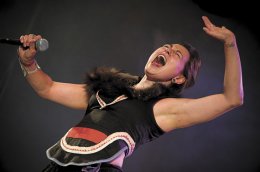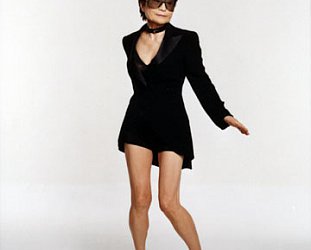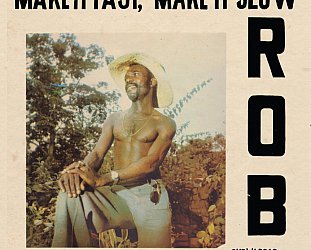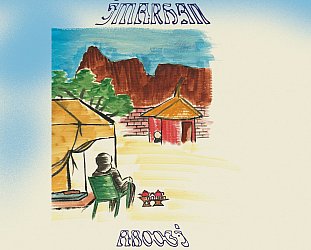Graham Reid | | 12 min read
Tagaq: Still (from Sinaa)

Inuit throat-singer and painter Tanya
Tagaq Gillis – who often performs simply as Tagaq – grew up in
remote Cambridge Bay (pop. 1500) in Canada's remote north. She went
to high school in Yellowknife where she still lives, but these day is
in demand on the concert circuit for her innovative throat-singing
which is grounded in a long tradition – Inuit women would sing in
pairs – but she has extended it by multi-track recording,
performing with the Kronos Quartet and working with
electronics.
Tagaq lives in many worlds: she has
killed caribou and rails against the PC crowd who would deny her
people the right to hunt seals. She plays sold-out concerts and in
small halls, tours and records with Bjork, and her distinctive sound provokes a profound response
in audiences: some walk out, some are reduced to tears.
In a profile in Canada's Globe and Mail
in late 2006, Robert Everett-Green wrote: “She seems to be dying,
having sex, giving birth and enacting someone's creation story all at
once. It's intensely erotic, and unsettling too, like looking in a
mirror and seeing the animal buried within us staring back”.
In early 2011 Tagaq will play the
Taranaki Womad in New Zealand, accompanied by a violinist and a DJ.
“I don't know if you are the farthest
place on the planet from me,” she said in an interview with
Elsewhere. “but I want to meet Maori people. We tattoo our faces
and are whale hunters too.
“I have a funny feeling that even
though I am going to furthest place on the planet for me it will feel
like I went home, I can feel it.”
As we spoke her seven-year old daughter
played around her feet – and made one amusing interruption. And
Tagaq laughed a lot also. Her words may appear serious on the page
but they were delivered with salty humour.
Tanya, I first discovered you through that Globe and Mail article when I was in Vancouver in 2006 and immediately went out and found your album Sinaa. I was absolutely astonished. I didn't know of Inuit throat singing t be honest, but I heard it as art music, more akin to people like Meredith Monk.
I know
there is a cultural component, but you are a contemporary music and
your peers are the likes of Bjork and Monk, because this is not
traditional music, is it?
I have a vast interest in sound and my
taste can range from music which is totally vapid and fun to stuff
that is pushing the envelope more, and that depends on the mood I am
in. I think the sounds I make are so strange that they attract people
that want to hear and feel something different, but I like dance
music sometimes – and metal and punk, but I just haven't got around
to doing those genres yet.
You are speaking at the New Frontiers
in Song and Electronics seminar. What line will you take?
It's pretty easy for me because of
where I am from. When you are from a town of 1500 people that far
from the North Pole and there is the tradition and all the stuff that
has happened in Canada with the government . . . I usually tend to
speak about socialisation and the reflection of your geography and
climate to society, and what that entails. And colonialism and
feminism . . . it's just whatever I feel like.
My talks, like my music, are
improvised. Usually it starts going into humour.
I know you were self-taught in this
style and when you were at university you got some tapes from your
mother of throat-singing. Was this music you had heard as a child or
was it something which reminded you of home.
It is home, it sounds like home and it
comes from tradition. I hadn't heard it much when I was growing up,
maybe when I was really small in Resolute Bay, but I knew it existed
and knew what it sounded like. I had never immersed myself in doing
it, but I always liked it.
Did your people see this as a break
with tradition or an extension of tradition?
That depended on who you were. There
was some hate mail, and some crudely erected Facebook pages. But that
has pretty much has disappeared and it was just a handful of people.
I have a lot of support from within my culture, they feel pretty good
about it.
To some extent you have become the
voice of Inuit people in that you speak in defense of traditional
practices such as seal hunting and whaling.
Yep, I do. There are only 27000 Inuit
people and I find it ridiculous the entire world . . . Look at
what's happening with climate change and colonialism, everyone is
raping the Earth, yet as soon as this tiny minority starts making
money there is seal bans. It's ridiculous.
Seals are like cows to us, their
population is more than there ever was – but for some reason
dip-shit Paul McCartney has decided it's bad to kill seals. Protest
McDonalds, protest something that's hurting people. I find it all
ridiculous.
It's like we [Inuit people] have to pay
for what other people have done to the planet, and it's because we
are small enough to be picked on. That's just my opinion from being
born and raised up there.
Seal skin is great, it's waterproof and
really really warm, and its gorgeous. It's also delicious. (laughs)
 I've seen the short film Tungijuq [see here] which is
very interesting and powerful -- and a way of getting a cultural
messages into the world. And congratulations, and I see it won
another award.
I've seen the short film Tungijuq [see here] which is
very interesting and powerful -- and a way of getting a cultural
messages into the world. And congratulations, and I see it won
another award.
Yeah, it's won a few. Hopefully it gets
the message out there, the whole life and Earth thing. I just got fed
up with things. If I get one more vegetarian tell me that there's no
culture on the planet that needs to ever eat meat!
Look, there's no trees, it's frozen
like 10 months of the year and today it's minus 64 in Cambridge Bay,
my hometown – and that's without the wind chill. So what are you
gonna do? Grow vegetables?
I just got sick of it and decided to
talk about it. Humans are so stupid, we have the nerve to think we
are the only things that matter on this planet. and it's never been
like that. People have embraced this ridiculous idea that we are the
only thing worth respecting that is why the whole Earth has gone to
shit. We can't live this way – and we are proving it to ourselves.
Inuit people would have been much
closer to the land, but I guess that has changed. We have Maori who,
through colonialism, had their lifestyle changed completely. I guess
much the same problems would pertain to Inuit peoples as to Native
Americans and indigenous people everywhere.
I have never been to New Zealand but I
am certain there are a lot of the same issues and problems. It is
really heart-wrenching – but also heart warming – to see people
blooming from nothing.
It's different for us of course because
it is so cold up here.
My mother was relocated from this
really beautiful place in Nunavut to this horrible place called
Resolute Bay because the government decided people needed to be there
so they could claim Canada, even though there was no game.
It's the same problems, a lot of
drinking, a lot of people looking down and judging but who haven't
been put through the same things. But I went to Resolute Bay and
found my cousins, and these women are so gorgeous and have hardly
anything but give so much in bringing up their children. The strength
that comes from strife is beautiful and powerful. As long as people
can take responsibility for themselves and their actions first and
foremost, and then start looking at what can happen externally.You
make sure your home is healthy first and then start helping others
and build the structure of safety in ourselves, and spread good news
from there.
 From my observations in Australia where
aboriginal people are in dire circumstance, and also in the US on the
rez, it appears it is predominantly women who take charge and make
the changes first. Would that be your observation in your
communities?
From my observations in Australia where
aboriginal people are in dire circumstance, and also in the US on the
rez, it appears it is predominantly women who take charge and make
the changes first. Would that be your observation in your
communities?
I'd like to think so, but there is also
not a lot of support. When people aren't healthy it is hard to
support each other so there are those strengths and weaknesses. I
understand what you are saying – the poverty, alcoholism, abuse and
the stuff people don't like talking about. I am sick of people not
talking about it.
I like using music for healing and
luckily enough I don't have to use words so people get an idea that I
am trying to open up thought patterns ways of thinking and getting in
touch with instincts and what is really right and really wrong.
In my life you can't tell me what is
right or wrong – and I don't care if you are the government or the
police or if you 10 feet taller than me. My morals are my morals and
my rights are my rights. Like, you can't tell me there I anything
wrong with marijuana when people are killing themselves with booze.
You can't tell me it is okay to hate someone for being gay.
Part of the problems in Nunavut is that
people who doing the abusing aren't being put away. It's like Lord of
the Flies, socialisation is such that if everyone says it okay then
it becomes okay.
But I wouldn't take back a single
minute of my life because whatever happened to me and my family and
culture has given birth to all this beauty. Yeah there is a lot of
bad stuff, but I can't imagine being born and raised in a huge city
and being never in touch with the land or yourself. Being totally
cradled in this little apartment box and never being heard and
thinking life is just great? What a nightmare!
What is going happen when shit hits the
fan and people start dying, when they get sick or you run out of
money. You have to be prepared for life, right?
 As long as we protect the women as much
we can, because we are the caregivers. So it is children and elders
in the centre, then women around the periphery and then the real men
-- real men – to protect and love us.
As long as we protect the women as much
we can, because we are the caregivers. So it is children and elders
in the centre, then women around the periphery and then the real men
-- real men – to protect and love us.
You said your music has this healing
quality, and this is largely because it is wordless and your voice is
a pure instrument -- so I guess many people respond on an intuitive level.
That's what I find. Sometimes after
shows I will have people that I have to hold and tell them its going
to be okay because they are crying so hard. Whatever you need to be
feeling, whatever you are pushing away, that is what I hope to draw
out – because that's the only way you fix things.
If your front step is creaky you don't
keep stepping over it until it falls off. Fix it.
If you don't know yourself how can you
move forward? I've met people who have never been on the land in
their whole life and have been living in this jail of what society
has constructed, which is ridiculous, because people feel lost.
We used to be schooled on not just our
brains but our bodies and spirits and what is inside of us, and I
think people have lost a lot of their instincts. We all know the
secret of what it is to be alive, but we have gotten lost.
I am in my own way too, but I'm hoping
I can unify people and feel them lighten. If I can spread a little
bit of goodness then that is what I feel I have to do.
It must be interesting then with the
Kronos Quartet because that hip, downtown Manhattan audience might be
the least connected to the land and they would hear you you in
particular way.
I've figured out for myself that even
though I am surround by people I am in solitude, like when I go home
I feel good – but people there haven't been to 30 countries like
me. And when I travel there are people who haven't been out on the
land, so I isolated myself in a strange way and it doesn't matter
where you are from because there are people in New York who have been
raised there and have that part of them which is are aware. But there
are people at home who are shut off and can't see past their noses
either. It's whether you are open or not.
So hopefully this is not just novelty.
I love it when people get all mad and walk out because they hate it.
Or when they love it. I don't like it in the middle. My nightmare is
that response, 'Oh isn't that a quaint little Eskimo'. I'd rather
someone dislike it.
You would get very little of the
Eskimo/igloo cliché stuff these days though?
No, sure. That's the word they learned
for us in school so its not really something that offends me. If I'm
in Canada and someone uses the word 'Eskimo' I won't get mad. Some
people have really taken it upon themselves to get really up in
everyone's faces about the tiniest little thing. Like, I don't give a
shit about Eskimo Pies (laughs). I ate them. I just don't care, why
would you care?
You look at the old Disney stuff and
it's horribly racist. And my mom is like, 'Yeah I smoked cigarettes
and drank beer when you were in my belly, but we didn't know any
different and look, everyone is okay'.
You can put the noose tighter and
tighter on anything. But let's start with your home and then pick
some actual issues and make it not okay to beat your wife. Let's work
on that and not care if some corporation 50 years ago started making
Eskimo Pies. There are the Edmonton Eskimos here in Canada, nobody if
freakin' out over that.
 Maybe I'm digging myself a hole here.
(laughs) I always get myself in trouble with my mouth all the time.
My opinions are very firm and I'm an opinionated girl and it's only
because of the thrust of the goodness in my heart that I think I have
the right to say thing.
Maybe I'm digging myself a hole here.
(laughs) I always get myself in trouble with my mouth all the time.
My opinions are very firm and I'm an opinionated girl and it's only
because of the thrust of the goodness in my heart that I think I have
the right to say thing.
All my friends think I am a total
retard, a real goof.
("Of course you are", chimes in her
daughter)
But people who only know me through my
music think I am like this guru or spiritual thing and am going to be
really serious – and that is just an element of me.
You find people who get upset and cry
look to you for an answer because of how deeply you've touched them?
Yeah, but it's all inside them. That's
the most rewarding thing to me. That in my music I opened up a little
part in someone that was closed, and by that opening and starting
that trickle flowing that their quality of life could be improved.
I wanna help, I just want to help.
Like the sound of this? Then check out this.







post a comment